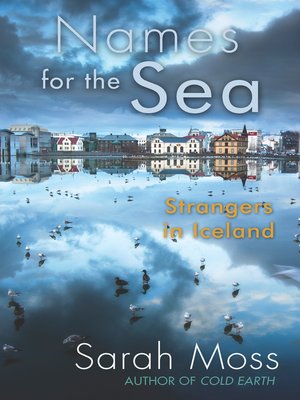English-language memoirs of life in Iceland are pretty hard to come by. The last one I read, My Journey to Iceland by Satu Rämö, was about a Finnish woman who married an Icelander and so became a permanent resident. Her story hints at some of the difficulty of being a “foreigner” in Iceland — the language, of course, but also other cultural differences, like Icelanders’ high tolerance for risk. Ultimately, Rämö seems to take these difficulties in stride, recognizing that adapting to a new society may take years, but also that she may never feel like a real Icelander. It helps, though, that she has a connection to the country through her in-laws, and the luxury of not being in a hurry.
Names for the Sea is a refreshingly different take. The author, Sarah Moss, accepts a job teaching English literature at The University of Iceland (Háskóli Íslands). Her family moves to Reykjavik from Kent, England just at the time of the 2008 financial crash. Going from two incomes to one, combined with the high cost of nearly everything in Iceland — from housing to fuel to produce — makes for a difficult transition. The story covers many aspects of Icelandic society from a unique perspective: early childhood education, politics, history, food, transportation, crime, class, weather, and even the somewhat-common belief in elves or “hidden folk.”
Despite the friendships the author makes, it’s clear this is a difficult year for her and her family. Not being tourists, they need to make an effort to adapt and assimilate, but they are also short on time and money, and arrive amidst a national crisis followed shortly by a volcano eruption. They face an uphill battle as foreigners in Iceland’s notoriously insular and tight-knit society.
Moss really does make the effort, though. She’s got a journalist’s instincts and follows her curiosity (or confusion) about Icelandic society to make connections with interesting people from all walks of life. From the widow of a famous poet who grew up in a village occupied by Allied forces during WWII, to survivors of the devastating volcanic eruption on the island of Heimaey in 1973, to people on both sides of the political uprising that followed the financial crisis, to a Danish-born chef trying to push the boundaries of Icelandic cuisine, Moss covers a lot of ground in this memoir of a single year.
I appreciate this book because, without being insulting or dismissive, the author doesn’t pull any punches. Iceland, despite it’s image as one of the world’s happiest nations, has flaws and contradictions like anywhere else. Names for the Sea leans into those as a way of fully and honestly exploring this remarkable place.
